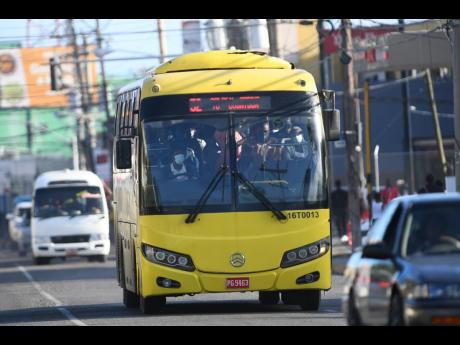JUTC on road to $11.4b record operational loss
Despite plans this year to add 50 new buses to its fleet, the Jamaica Urban Transit Company Limited (JUTC) is projecting an operating loss of $11.4 billion for the upcoming financial year. This represents a $2.6 billion increase in the cash-...
Despite plans this year to add 50 new buses to its fleet, the Jamaica Urban Transit Company Limited (JUTC) is projecting an operating loss of $11.4 billion for the upcoming financial year.
This represents a $2.6 billion increase in the cash-strapped state-owned bus company’s operating loss over the current 2022-2023 fiscal year.
Last year, the company racked up an operating loss amounting to $8.8 billion.
Opposition Spokesman on Transport Mikael Phillips said the more than $11 billion projected operating loss for 2023-2024 would be the highest recorded by the company.
He said the Government needs to come up with an urgent plan for the JUTC as the company’s viability as a going concern is now in question.
“There is no other agency of the Government that requires such significant subvention like the JUTC and records such a significant loss without the Government stepping in and cauterising the haemorrhaging,” Phillips noted.
An examination of the Jamaica Public Bodies estimates of revenue and expenditure, which was tabled in Parliament last Tuesday, showed that the JUTC has forecast a $14 billion loss in the 2023-2024 financial year before a $7 billion grant by the Government is taken into account.
For the current fiscal year that ends in March, the JUTC is expected to rack up losses of $11 billion. When a Government grant of $6.5 billion is accounted for, the company will see a net loss of $4.6 billion in 2022-2023.
The JUTC is mandated to provide 25,000 to 31,000 seats per day to meet the demands of the commuting public within the Kingston Metropolitan Transport Region.
However, Phillips noted that the JUTC fleet has declined by about 50 per cent, meaning that the company is only providing an estimated 12,000 seats daily.
He said that the JUTC needs to have between 400 and 450 buses rolling out daily to satisfy demand, but it is now only putting 200 buses on the road daily.
“Adding 50 buses is not even carrying them close to the required amount of buses that the JUTC has a licence to provide,” he added, referring to the long-announced and delayed boost to the fleet.
The age of the current fleet is also of concern to Phillips, who contended that about 40 per cent should be retired, adding that the company has been spending too much on parts because many of the buses are more than 15 years old.
He urged the Government to replace at least 100 buses a year over a four-year period “so that we can take out those that are costing taxpayers more to maintain”.
At the same time, it appears the cashless system announced by the JUTC management for implementation this month may not meet its deadline.
In November 2022, Managing Director of the JUTC Paul Abrahams told members of the Public Administration and Appropriations Committee of Parliament that the tender process had started and the evaluation was completed by the Ministry of Transport and Mining.
Several calls placed by The Gleaner to Abrahams’ phone have gone unanswered, and Transport Minister Audley Shaw’s phone also rang without answer.
Dr Alwin Hales, permanent secretary in the Ministry of Transport and Mining, did not return a call made to his office for comment.

